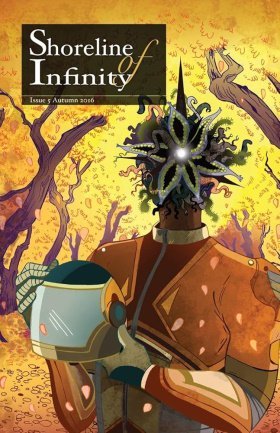It wasn’t about the money. Hell, it wasn’t even about revenge, really. If Tjssin had just stayed put, none of this need have happened. He knew exactly what he was doing when he ran; he knew us.
We never walk away from a challenge.
The ship began to rumble and glow as it dipped into atmosphere. If there were smart cannon down there, we would know about it soon enough. We dropped through the bottom of a layer of thick, orange cloud and banked hard over a cracked and blackened landscape. A lone mountain loomed in the distance, its peak wreathed in cancerous smog.
“Subtle.” said Melano.
There, extending from the side of the mountain was a stepped pyramid more than a mile in length. The pyramid was made of solid diamond.
“Why would Tjssin build something so obvious?” I asked myself out loud.
“I don’t know, but I don’t like it.” said Melano, monitoring the wide spectrum scanners with a suspicious eye. Nothing had tried to stop our approach, yet.
We flew on.
A thick, petrochemical rain beat down on the plateau, washing across slick acres of diamond painted ruby red in Gillespie’s amplified glow. I stepped cautiously, hefting the repeating coil gun the ship had grown for me. Melano favoured a compact but high powered maser. We communicated subvocally, via the linked machines in our blood.
Inside?
Where else?
It could be a decoy.
It’s the only man-made thing on the planet, Melano.
Who says it’s even Tjssin in there? This thing could have been built by anyone. Fucking aliens for all we know—
Do you really believe that?
… no.
The resonance had been building since we made orbit, and I knew Melano was feeling it too. It was stronger than anything I’d experienced before; the deja vu physically dizzying now. Each step echoed jarringly in my head as we made our way across the vast plateau.
Tjssin was near.
We passed out of the oily rain through a ten metre high portal carved into the side of the mountain. The sides of the monumental passageway were clad in diamond chased with graphite inlay; tumbling, geometric fractals that confounded any true sense of scale. It soon became evident that the passage was narrowing as it burrowed. Its false perspective constricted to a bottleneck after only a few dozen metres, forcing us to continue in single file.
I’ll go first, I subvocalised. It was no act of bravery on my part; we both knew fine well that my weapon would have the best chance against any hardened defences that might lurk inside.
Melano sent her agreement.
It was dark ahead. I switched my vision to wide spectrum composite and checked that Melano had done the same. The suddenly exaggerated perspective of the dwindling tunnel made my heart leap; we had been here before.
The tunnel hemmed in until it almost scraped my elbows. The heft of the coil gun under Hancock’s two gee’s suddenly seemed less reassuring than it had when we stepped off the ship; my arms trembled from the effort of keeping it pointed straight. The passage tilted down into the earth, dropping until the faint reflected glow of Gillespie was extinguished entirely. We continued a hundred metres or more in tense silence before the passage changed again.
Without warning, the walls sprang apart to reveal a chamber which was maybe hundreds of metres in diameter. The steps of our bare feet echoed horribly as we padded out into the vast space. There were no automated anti-intrusion devices, no hidden pitfalls; nothing popped out of the ground and blasted us into tiny pieces. It wasn’t exactly an unpleasant development, but it did surprisingly little to calm my jangling nerves.
Where is the bastard? sent Melano.
I had asked myself the same question.
Further inside? I sent, This could be just the first chamber; there’s enough space under this mountain for these passages to go on for miles.
A maze? Melano laughed, her trepidation not entirely masked by the subvocal synthesiser. Fucking great.
I guess we’ll find out, I replied.
Through the sonic gloom of our reflected footsteps, I made out rows of long, oblong blocks about waist-high lining either side of a wide central avenue. We made for the left, ducking behind the blocks and staying low as we moved further into the space.
What isthis place?
Whatever it was, it was big. The strange shapes extended into indistinction in every direction; there must have been thousands of them.
I was just about to hazard my best wild guess when the lights slammed on and our guns exploded like confetti in our hands.
“Welcome.”
The voice echoed endlessly in the enormous diamond vault.
“Welcome, dear guests, to your home away from home.”
It was a voice I recognised.
“I hope you like what we’ve done with the place.”
It was not Tjssin’s voice.
“Please, do come out from there. There’s no point in hiding.”

























